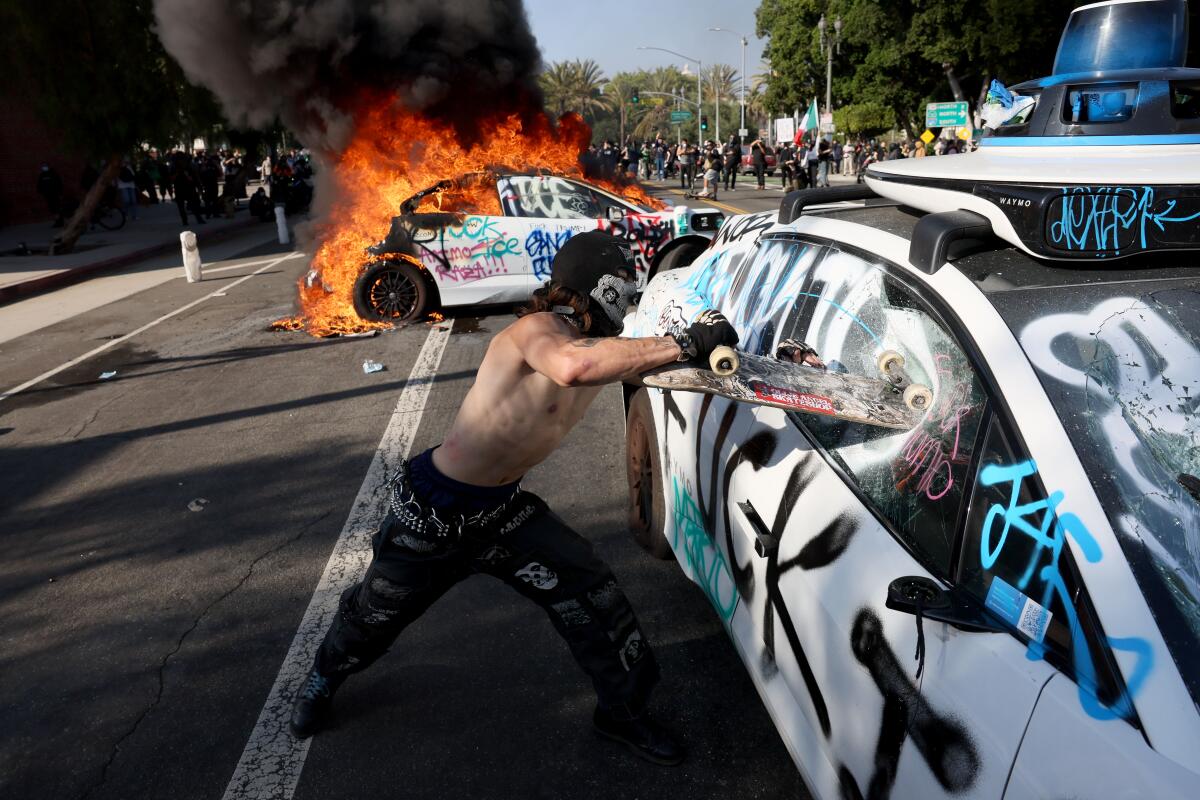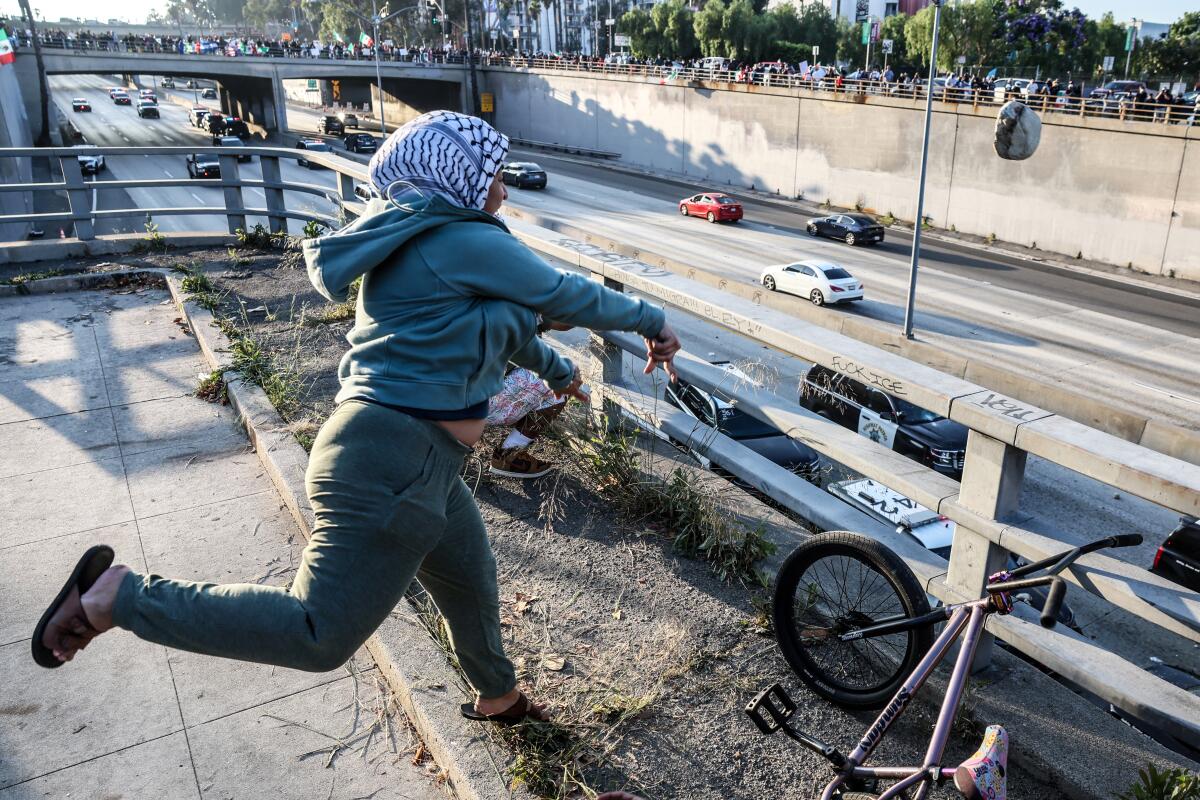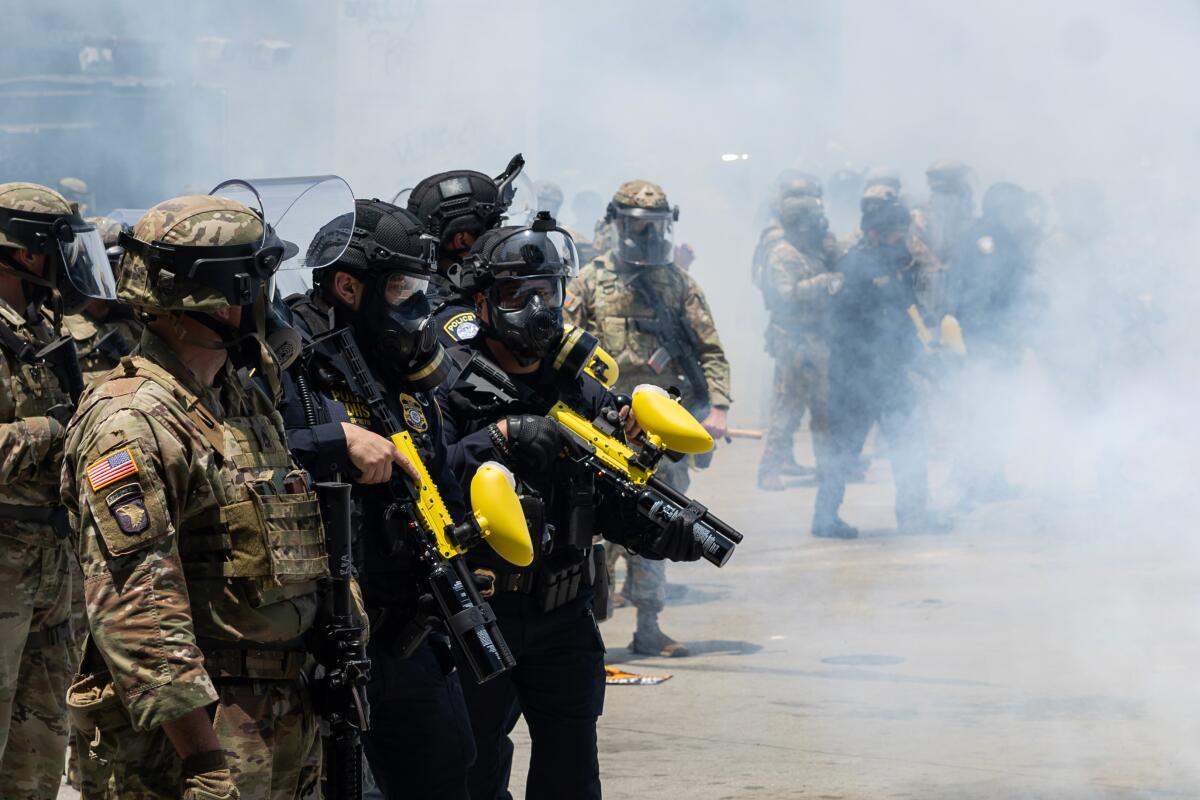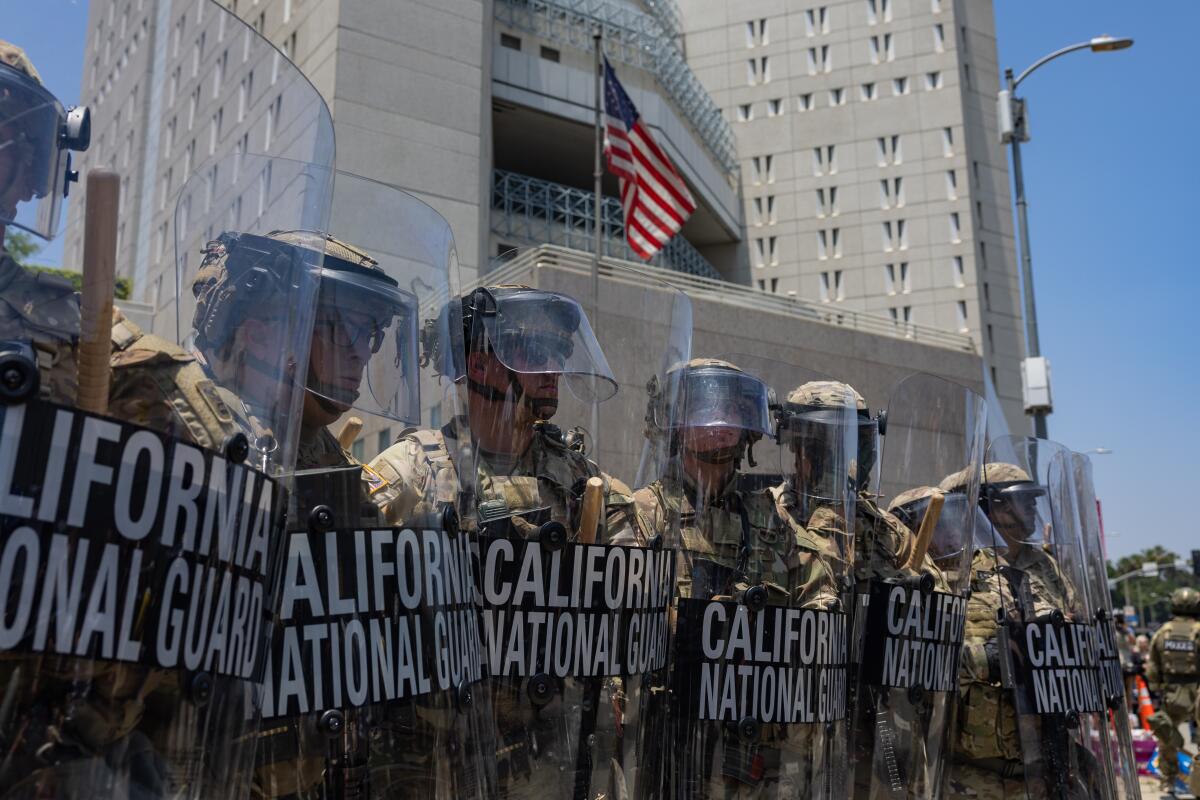Protesters or agitators: Who is driving chaos at L.A. immigration protests?

- Share via
The crowd near Los Angeles City Hall had by Sunday evening reached an uneasy detente with a line of grim-faced police officers.
The LAPD officers gripped “less lethal” riot guns, which fire foam rounds that leave red welts and ugly bruises on anyone they hit. Demonstrators massed in downtown Los Angeles for the third straight day. Some were there to protest federal immigration sweeps across the county — others appeared set on wreaking havoc.
Several young men crept through the crowd, hunched over and hiding something in their hands. They reached the front line and hurled eggs at the officers, who fired into the fleeing crowd with riot guns.
Jonas March, who was filming the protests as an independent journalist, dropped to the ground and tried to army-crawl away.
“As soon as I stood up, they shot me in the a—,” the 21-year-old said.
Police Chief Jim McDonnell has drawn a distinction between protesters and masked “anarchists” who, he said, were bent on exploiting the state of unrest to vandalize property and attack police.
“When I look at the people who are out there doing the violence, that’s not the people that we see here in the day who are out there legitimately exercising their 1st Amendment rights,” McDonnell said Sunday. “These are people who are all hooded up — they’ve got a hoodie on, they’ve got face masks on.”
“They’re people that do this all the time,” he said. “They get away with whatever they can. Go out there from one civil unrest situation to another, using the same or similar tactics frequently. And they are connected.”

Violence and widespread property damage at protests in downtown L.A. have diverted public attention away from the focus of the demonstrations — large-scale immigration sweeps in predominantly Latino cities such as Paramount, Huntington Park and Whittier.
Instead, the unrest has trained attention on a narrow slice of the region — the civic core of Los Angeles — where protests have devolved into clashes with police and made-for-TV scenes of chaos: Waymo taxis on fire. Vandals defacing city buildings with anti-police graffiti. Masked men lobbing chunks of concrete at California Highway Patrol officers keeping protesters off the 101 Freeway.

McDonnell said some agitators broke up cinder blocks with hammers to create projectiles to hurl at police, and others lobbed “commercial-grade fireworks” at officers.
“That can kill you,” he said.
The LAPD arrested 50 people over the weekend. Capt. Raul Jovel, who oversaw the department’s response to the protests, said those arrested included a man accused of ramming a motorcycle into a line of officers and another suspect who allegedly threw a Molotov cocktail.

McDonnell said investigators will scour video from police body cameras and footage posted on social media to identify more suspects.
“The number of arrests we made will pale in comparison to the number of arrests that will be made,” he said.
Representatives of the Los Angeles city attorney and Los Angeles County district attorney’s office could not immediately say whether any cases were being reviewed for prosecution. Dist. Atty. Nathan Hochman said those who “hurl cinder blocks, light vehicles on fire, destroy property and assault law enforcement officers” will be charged.
On Sunday, the LAPD responded to a chaotic scene that began when protesters squared off with National Guard troops and Department of Homeland Security officers outside the Metropolitan Detention Center.
Around 1 p.m., a phalanx of National Guard troops charged into the crowd, yelling “push” as they rammed people with riot shields. The troops and federal officers used pepper balls, tear gas canisters as well as flash-bang and smoke grenades to break up the crowd.
No one in the crowd had been violent toward the federal deployment up to that point. The purpose of the surge appeared to be to clear space for a convoy of approaching federal vehicles.
Department of Homeland Security police officers had asked protesters to keep vehicle paths clear earlier in the morning, but their commands over a loudspeaker were often drowned out by protesters’ chants. They offered no warning before charging the crowd.

Some in the crowd lobbed bottles and fireworks at the LAPD. Two people rode motorcycles to the front of the crowd, revving their engines and drawing cheers from bystanders. Police accused them of ramming the skirmish line, and the motorcycles could be seen fallen over on their sides afterward. The drivers were led away by police, their feet dragging across asphalt lined with shattered glass and spent rubber bullets.
On the other side of the 101, vandals set fire to a row of Waymos. Acrid smoke billowed from the autonomous taxis as people smashed their windows with skateboards. Others posed for photographs standing on the roofs of the burning white SUVs.
After CHP officers pushed protesters off the 101 Freeway, people wearing masks flung chunks of concrete — and even a few electric scooters — at the officers, who sheltered under an overpass. A piece of concrete struck a CHP car, drawing cheers from the crowd.

Closer to City Hall, the LAPD pushed demonstrators toward Gloria Molina Grand Park, where some in the crowd wrenched pink park benches from their concrete mounts and piled them into a makeshift barricade in the middle of Spring Street.
The crowd, which included a Catholic priest wearing his robes and a woman with a feathered headdress, milled behind the barricades until LAPD officers on horseback pushed them back, swinging long wooden batons at several people who refused to retreat. Video circulating online showed one woman being trampled.
The crowd moved south onto Broadway, where the LAPD said businesses reported being looted around 11 p.m. Video recorded by an ABC7 helicopter showed people wearing masks and hooded sweatshirts breaking into a shoe store.
McDonnell said the scenes of lawlessness disgusted him and “every good person in this city.”
Before any chaos erupted Sunday, Julie Solis walked along Alameda Street holding a California flag, warning protesters not to engage in the kind of behavior that followed later in the day.
Solis, 50, said she believed that the National Guard was deployed solely to provoke a response that would justify further aggression from federal law enforcement.
“They want arrests. They want to see us fail,” she said. “We need to be peaceful. We need to be eloquent.”
More to Read
Sign up for Essential California
The most important California stories and recommendations in your inbox every morning.
You may occasionally receive promotional content from the Los Angeles Times.














